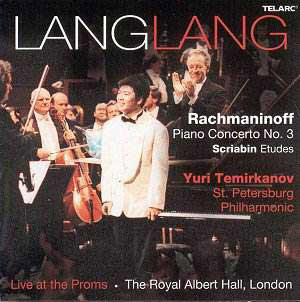The booklet contains the usual assurances about "history
in the making" etc, but we’re used to this and wary. I would single
out the op. 8/11 étude as evidence that this is an artist of
real quality. This dreamy music is caught to absolute perfection and
with rare poetry. In general the Scriabin group is handled with both
great observance of the score and total spontaneity. The naturalness
of Lang Lang’s talent is not in doubt. However, I would point to op.
8/12 which, among much that is sweepingly fine, sounds a warning bell
or two. Lang Lang has a habit, when the music is building up to a climax,
of pulling back, drifting into a piano and then starting to build
up again. This could become a mannerism if it is not checked, and I
think it accounts for the fact that the Rachmaninov (I noted a particular
example of this in the first movement cadenza) is more effective in
reverie than in surging climaxes.
Granted that Lang Lang and Temirkanov seem to be agreed
in presenting a rather elegiac view of the concerto – on his own the
conductor gets lethargic at times – and granted that there is a lot
of highly poetic work here, the performance seems not yet entirely focused.
In the second movement, in particular, changes of tempo sometimes burst
upon us, spoiling the flow and segmenting the music.
Another reason why this is a nice souvenir of an artist
who is surely here to stay rather than a first choice for Rach 3 is
that the recording is not ideally balanced. Near the beginning the piano
seemed too forward, obscuring the melodic writing in the strings, then
later some wind solos, particularly from the bassoon, popped right out,
yet, when we really needed to hear them, as when in the second movement
the first movement main theme is recalled against iridescent piano writing,
these same wind instruments are hardly audible. The microphones have
concentrated on the strings’ front desks to the extent that we hear
their individual vibrato, and this has the effect of making it sound
as though they are only about four to the part, which I presume was
not the case.
So, a slightly guarded welcome, and a suggestion that
Lang Lang works, at least on record, mainly on smaller canvasses for
the moment (more Scriabin? Some Chopin?) until he has filled out to
heroic-concerto size. But, if you want to follow the career of a highly
promising talent, don’t hesitate, and some of the Scriabin performances
will not be easily bettered elsewhere.
Christopher Howell
See also review
by Jonathan Woolf
Marc
Bridle interviews lang Lang


![]() See
what else is on offer
See
what else is on offer 